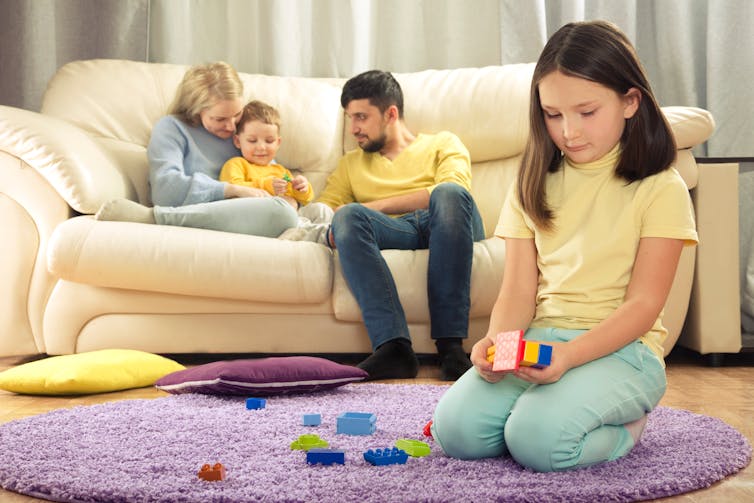Why the Yyoungest Child in a Large Family Ends Up Being Hated by the Siblings in Aduthood

When parents play favourites, what happens to the kids?
Many siblings, when they get together as adults, joke nigh which child was loved the virtually. But is it really a joke or is there an border of truth that still rankles us?
In one report, researchers asked adults whether their mom played favourites when they were kids. Shut to 85 per cent of respondents perceived that she did.
Just surely once nosotros movement out of the nest, our badgerer regarding sibling favouritism subsides? No so. Upset from perceived favouritism appears to exist long-lasting.
It is likely that we will fret long into adulthood over why a detail sibling got a better deal than nosotros did.
Is sibling favouritism real, or perceived?
It turns out parents do comport differently with their children and, of course, children have their dissimilar thresholds for noticing these differences.

Researchers have studied favouritism both past observing children every bit they interact with their parents and past asking children and their parents to report on their interactions. How frequently exercise the parent and child express joy or play together? How often do they fight or argue?
These ratings are then compared across the different siblings to determine if one kid receives more positive or negative attention than the other.
One of the reassuring findings from these studies is that when the differences in how siblings are treated by parents are small-scale, information technology has niggling to no consequence.
It is only when the differences are big that we see links to children'due south health and relationships.
Parental stress plays a role
Enquiry on all dissimilar kinds of relationships shows u.s. that a big role of how we get along with others is about the fit of personalities. We find one person easier or more interesting than some other. The same holds for parents and children.
Although most parents love and nurture all their children, they will inevitably find that they are more in tune with one child than another. I child is perhaps a bit more social; another is more ready to anger, a 3rd finds learning easier.
These differences in how parents treat siblings accept a basis in children's genes. Parents treat identical twins, who share 100 per cent of their Dna, more similarly than they treat not-identical twins, who share about 50 per cent of their genes.
The more the personalities of siblings differ, the more their parents treat them differently.
Some other commuter of parenting is, of course, a child's age. Parents interact with and bailiwick their children based on changes in developmental capabilities as they grow. Age and personality explain some of the differences in the parental handling that children perceive.
But while age and personality play a role in why one kid gets more from a parent than another, over and above this are issues of parental stress. When parents experience fiscal strain, mental wellness problems or partner conflict, differential parenting or sibling favouritism becomes more marked.
Impacts on physical and mental well-beingness
Unfortunately, perceived favouritism can create a divide between siblings. It is associated with siblings feeling less close to one another, both in childhood and adulthood.
This finding has been established for both perceived, besides as observed favouritism.

Popular wisdom suggests that the favoured child receives benefits from their special handling. While this may be the instance when favouritism is slight, inquiry suggests that none of the siblings benefit when information technology is more than marked. That is, when favouritism is considerable, information technology is associated with all siblings showing less physical and mental well-being.
Reasons for this are not currently clear. It is possible that children are activated by injustice. Or possibly even when they are favoured they fear falling into the realm of existence disfavoured.
Merely most reassuring for parents are the findings that parental explanations for why they are treating siblings differently really change the experience for children. Explanations that focus on their unlike personalities, ages or needs are associated with lower levels of distress for children.
Five tips for fairer parenting
-
Be enlightened. The commencement step is to exist enlightened that it happens, and to seek out assist or support from partners, family members, friends or wellness professionals — to endeavor to sympathise why it happens. Every bit a reminder, playing favourites is more likely to occur when your stress levels are loftier.
-
Mind. When your child complains or you lot see fights between siblings in which they mention one getting more than than another, try not to discount it. Be receptive to the child's feelings and recall about why they might be feeling this style.
-
Provide an explanation. Sometimes, children practise need to be treated differently, similar when i kid is sick, hurt or has special needs. When this happens, explain it to avoid any misunderstanding.
-
Avert comparing children. While it may be a natural trend to say "why tin can't yous exist more like your sister?" this sets up an unfair comparison. Endeavor to focus on what each child does well, without pitting them confronting one another.
-
Carve out individual time for each child. Equally much as possible, try to find 10 minutes each day to spend one-on-one with each child so that each has your full attention. Do any action that they love to do with you.
Pembaca kami
Jumlah pembaca The Conversation sebanyak 18 juta pengguna setiap bulan, dan melalui Creative Eatables republikasi menjangkau 42 juta pembaca.
Mau menulis?
Tulis artikel dan bergabung dengan komunitas akademisi dan peneliti yang terus tumbuh dengan lebih dari 142.100 dari 4.302 lembaga.
Daftar sekarang
Source: https://theconversation.com/when-parents-play-favourites-what-happens-to-the-kids-110019

0 Response to "Why the Yyoungest Child in a Large Family Ends Up Being Hated by the Siblings in Aduthood"
Post a Comment